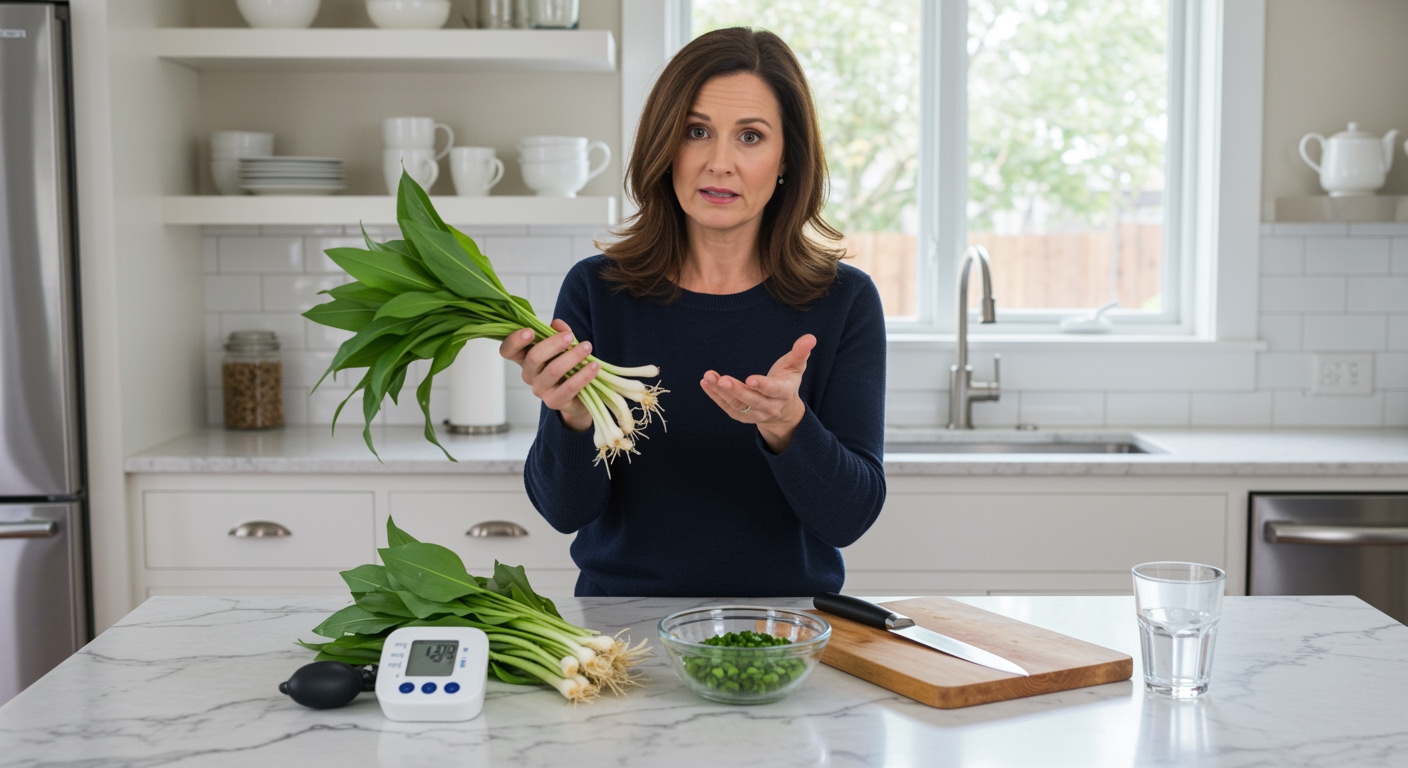✪ Key Takeaway: Ramps contain compounds that may lower blood pressure, but dangerous drops are unlikely in healthy people eating normal portions.
Introduction
Spring brings excitement for ramp lovers who eagerly hunt these wild leeks in forests across North America.
You might wonder if eating ramps could drop your blood pressure too low, especially if you already take blood pressure medications or have naturally low readings.
Hi, I’m Abdur, your nutrition coach and today I’m going to explain exactly how ramps affect your blood pressure and whether you need to worry about dangerous drops.
What Makes Ramps Different From Regular Onions?
Ramps belong to the allium family just like garlic, onions, and leeks, but they pack a more concentrated punch of bioactive compounds.
These wild plants contain higher levels of organosulfur compounds compared to their cultivated cousins because they grow slowly in harsh forest conditions.
The main compound responsible for blood pressure effects is allicin, which forms when you chop, crush, or chew ramps.
Allicin works by promoting the production of nitric oxide in your blood vessels, which causes them to relax and widen.
This vasodilation effect naturally lowers blood pressure by reducing the resistance your heart faces when pumping blood through your arteries.
Research shows that allium vegetables can reduce systolic blood pressure by 3-15 mmHg and diastolic pressure by 2-9 mmHg in people with elevated readings.
✪ Fact: Ramps contain 2-3 times more organosulfur compounds than regular onions due to their wild growing conditions.
How Much Ramps Would Actually Affect Your Blood Pressure?
The blood pressure lowering effect of ramps depends heavily on the amount you consume and how often you eat them.
Most people eat ramps as a seasonal delicacy in small amounts, typically 2-4 bulbs per serving, which contains roughly 50-100mg of organosulfur compounds.
Studies showing significant blood pressure reductions used much higher doses, equivalent to eating 10-20 ramp bulbs daily for several weeks.
Your body also develops tolerance to these compounds over time, meaning the initial blood pressure drop becomes less pronounced with regular consumption.
The peak effect occurs 1-3 hours after eating ramps, when allicin levels reach their highest concentration in your bloodstream.
For most healthy adults, eating a normal serving of ramps might lower blood pressure by 2-5 mmHg temporarily, which is considered mild and safe.
✪ Pro Tip: Start with small amounts of ramps if you have never eaten them before to gauge your individual response.
Who Should Be Cautious About Eating Ramps?
People taking blood pressure medications should monitor their readings more closely when eating ramps regularly during spring season.
The combination of medication and ramps could potentially cause additive effects, leading to lower than intended blood pressure readings.
Individuals with naturally low blood pressure (hypotension) below 90/60 mmHg should be especially mindful of portion sizes.
Symptoms of dangerously low blood pressure include dizziness, fainting, nausea, and rapid shallow breathing after standing up quickly.
Pregnant women should also exercise caution since blood pressure naturally fluctuates during pregnancy, and additional drops could affect placental blood flow.
If you experience any concerning symptoms after eating ramps, stop consumption and consult your healthcare provider immediately.
✪ Note: Always inform your doctor about seasonal foods like ramps if you take blood pressure medications regularly.
What Does The Research Actually Show?
Scientific studies on allium vegetables show modest blood pressure reductions that are generally beneficial rather than dangerous for most people.
A comprehensive review found that garlic supplements (containing similar compounds to ramps) reduced systolic pressure by an average of 8.4 mmHg in hypertensive individuals.
However, these studies used concentrated extracts equivalent to eating large amounts of fresh alliums daily, far more than typical dietary consumption.
Research specifically on ramps is limited, but their compound profile suggests similar but potentially stronger effects than regular garlic or onions.
No studies have reported dangerous blood pressure drops from eating normal amounts of wild alliums like ramps in healthy populations.
The cardiovascular benefits of eating ramps likely outweigh the risks for most people, especially those with elevated blood pressure.
✪ Fact: No documented cases exist of dangerous hypotension from eating normal portions of ramps or similar wild alliums.
How To Enjoy Ramps Safely?
Start with small portions of 1-2 ramp bulbs per meal to assess your individual tolerance and blood pressure response.
Monitor your blood pressure at home if you take medications or have a history of cardiovascular issues when first adding ramps to your diet.
Cooking ramps reduces their allicin content compared to eating them raw, which may minimize any blood pressure effects while preserving flavor.
Space out your ramp consumption throughout the short spring season rather than eating large amounts in single sittings.
Stay well hydrated when eating ramps, as proper hydration helps maintain stable blood pressure and reduces the risk of orthostatic hypotension.
Consider timing your ramp consumption earlier in the day when you can monitor symptoms more easily rather than eating them late at night.
✪ Pro Tip: Keep a food and blood pressure diary during ramp season to track any patterns or changes in your readings.
The Bottom Line
Ramps can lower blood pressure mildly due to their organosulfur compounds, but dangerous drops are extremely unlikely when eating normal portions.
Smart eating means understanding your food without fearing it unnecessarily, and ramps deserve a place on your spring table when consumed thoughtfully.
Share your experiences with ramps and blood pressure in the comments below, or let me know if you have questions about incorporating these wild spring vegetables into your healthy eating plan.
References
At NutritionCrown, we use quality and credible sources to ensure our content is accurate and trustworthy. Below are the sources referenced in creating this article:





